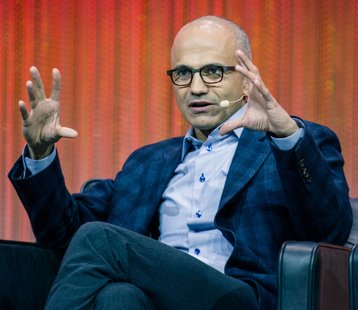Over the past three months, lobbying efforts by technology firms to influence US government policy have intensified.
The period from April 1 to June 30 saw record spending by giants like Amazon, Google and Microsoft on a myriad of issues, as well as increased contributions from data center players like Equinix and Iron Mountain, which are interested in federal data center consolidation initiatives and broader regulation of the sector.
Lobbying Prime
Latest federal records show that Amazon spent a record $3.2 million on lobbying in the second quarter of the year. For a company of this scale, efforts in the Senate, House of Representatives and numerous departments were spread across a number of issues, including those affecting Amazon Web Services.
Topics directly impacting data centers included renewable energy taxes, data protection, encryption, cross-border data flows, critical infrastructure protection, transaction security, government procurement and federal IT modernization.
Under a lobbying initiative on cloud computing, Amazon discussed the Cyber Privacy Fortification Act of 2017, which mandates “criminal penalties for intentional failures to provide required notices regarding security breaches of computerized data.”
The company also specifically targeted the Department of Defense to lobby on “issues related to the IT provisions of the National Defense Authorization Act for FY 2018 (H.R. 2810) and government procurement.” H.R. 2810 authorizes $695.9 billion in funding for defense, including $8bn for cyber operations ($647m of which is for the US Cyber Command). The military is in the middle of an aggressive IT overhaul, hoping to reduce the number of data centers it uses by fiscal year 2025 from hundreds to just four enduring sites in the contiguous United States and six abroad.
In the past, AWS has successfully pushed for major deals within the US government, notably scoring a $600m cloud contract with the CIA back in 2013, as well as building a $200m data center for the DoD.
As it undertakes a major acquisition of retail chain Whole Foods for $14bn, the company’s lobbying spend - roughly double that of last year - makes some sense. But perhaps there is another reason: the current President does not like Amazon, or its founder Jeff Bezos, who owns The Washington Post.
President Trump has repeatedly made statements about the Post as if it was a subsidiary of Amazon, just this week tweeting: “It’s hard to read the Failing New York Times or the Amazon Washington Post because every story/opinion, even if should be positive, is bad!”
In response to news stories critical of his administration, Trump has made several comments about taxing Amazon. In June, he said: “The #AmazonWashingtonPost, sometimes referred to as the guardian of Amazon not paying internet taxes (which they should) is FAKE NEWS!”
In its disclosure form, the company said that it lobbied the National Economic Council on issues related to tax, including corporate tax reform. The NEC is headed by Gary Cohn, former president and COO of Goldman Sachs, who is believed to be one of the more influential voices in the Trump administration.
What they are searching for
Not to be outdone by Amazon, Google also splashed some cash. At just under $5.4m, it was the highest-spending tech company on the list, fielding a veritable army of lobbyists from its 54,000 square foot (5,016 sq m) headquarters in Washington.
Again, various topics were covered, but areas impacting data centers included: EU-US Privacy Shield, transparency related to the Foreign Intelligence Surveillance Act and national security orders, data breaches, Law Enforcement Access to Data Stored Abroad Act, government access to electronic communications records and Internet governance.
With Google powering all of its data centers with renewable energy (primarily via Power Purchase Agreements), the company also lobbied on wind power, geothermal power and, interestingly, nuclear power.
As Google, alongside Alphabet’s subsidiaries Verily and Calico, moves further into the lucrative healthcare market, its lobbying in this area has increased. This could be related to Verily’s Project Baseline, an initiative to collect genetic data, blood samples, medical images and other information from 10,000 individuals for four years, requiring advanced sensor-based technologies.
Such data would need to be stored in a secure environment, likely on Google Cloud, with the company also lobbying on healthcare IT and health data policy.
With the US government scaling back science funding - in particular, aiming to slash funds for the Department of Energy - crucial early investments in high performance computing and cutting-edge technologies are at risk. With this in mind, Google has lobbied the House of Representatives on government funding for science, the first time it has done so.
Meanwhile, as the European Union levies multi-billion dollar fines against Google for alleged anti-competitive practices, the corporation has lobbied US politicians on competition regulation and antitrust law, both domestic and international.
It looks like you are trying to lobby the government
Another major cloud player, and an old hand at political lobbying - Microsoft - spent $2.07m on pursuing its agenda.
Its favourite topics included protection of critical infrastructure and cyber security; licensing, competition, trade, and government procurement in the software industry; health IT procurement, including health reform and related IT issues; private sector preparedness for cyber attacks; competitiveness and the high-tech sector; policy issues in cloud computing; data breach legislation; open government, government modernization, and technology choice.
It particular, the company lobbied on the Modernizing Government Technology Act of 2017, which authorizes Chief Financial Officers in the public sector to establish an information technology system modernization fund. Specifically, it asks CFOs to ensure there are funds to “transition legacy information technology systems to cloud computing and other innovative platforms and technologies.”
Microsoft also lobbied on cyber security policies and legislation related to international cyber security norms - an area the company has been drawn into, after exploits targeting its sofware were stolen or leaked from the US National Security Agency. Those zero-day vulnerabilities have led to viral outbreaks, including this year’s WannaCrypt infection.
“This attack provides yet another example of why the stockpiling of vulnerabilities by governments is such a problem,” Microsoft president and chief legal officer Brad Smith wrote in May.
“This is an emerging pattern in 2017. We have seen vulnerabilities stored by the CIA show up on WikiLeaks, and now this vulnerability stolen from the NSA has affected customers around the world. Repeatedly, exploits in the hands of governments have leaked into the public domain and caused widespread damage. An equivalent scenario with conventional weapons would be the US military having some of its Tomahawk missiles stolen. And this most recent attack represents a completely unintended but disconcerting link between the two most serious forms of cybersecurity threats in the world today – nation-state action and organized criminal action.”
Earlier in the year, Microsoft called for a Digital Geneva Convention that would include the stipulation to prevent use of cyber weapons against tech companies, the private sector or critical infrastructure.
Another issue that is all-too-familiar to Microsoft is the question of government access to citizens’ data stored abroad. After a protracted legal battle with the Department of Justice over whether it could access emails stored in a Microsoft data center in Ireland, the company appears to have won. But that hasn’t stopped Microsoft from shelling out on lobbying efforts related to the EU-US Privacy Shield agreement, as well as legislative proposals related to government surveillance, transparency and FISA court reform.
Having recently opened a cutting edge R&D group within its pre-existing AI team, it should also come as no surprise that Microsoft lobbied on issues related to artificial intelligence.
Equally, as another company using 100 percent renewable energy for its data centers, and one of the firms to publicly condemn President Trump’s decision to pull out of the Paris Climate Agreement, Microsoft lobbied on energy efficiency, climate change policies and renewables.
Finally, with the Chinese government pursuing controversial cyber security strategy that requires domestic data to be stored within the country, and Western cloud companies to partner with Chinese counterparts, Microsoft lobbied for market access and innovation policy issues abroad.
Late last year, the company raised objections in China to the rules that could see software companies, network equipment manufacturers and other technology suppliers provide the government with proprietary source code to demonstrate that it cannot be compromised by hackers.
US Business Machines
IBM was keen to show that, like the hipper, younger and more millennial-friendly likes of Google and Amazon, it too can lobby America. Spending $1.66m, the company doubled down on the offer its CEO made in November 2016 - to help the Trump administration.
IBM lobbied on all sorts of procurement and regulatory issues, some of which included data center-related matters.
For example, it lobbied on: H.R. 244, which provides FY 2017 appropriations for most federal agencies for the year; “DoD FY 2018 appropriations - IT procurement, the Modernizing Government Technology Act;” and data center consolidation as a whole.
The DoD was of particular interest to IBM, with the company lobbying on DoD public/private partnerships, and the Defense Information Systems Agency’s commercial cloud. Earlier this year, IBM was chosen to build and operate a data center in the Redstone Arsenal army post in Huntsville, Alabama, as part of the Army Private Cloud Enterprise (APCE) program.
It also lobbied on a topic simply noted as “DoD/Cognitive” - perhaps in relation to the ‘brain-inspired’ IBM TrueNorth Neurosynaptic System, a supercomputer for the US Air Force Research Laboratory (AFRL) announced last month.
Another industry that IBM invested time and money in was healthcare, where it has heavily promoted its Watson AI system. It lobbied on Center for Medicare and Medicaid Services Program Integrity, and cognitive computing for healthcare and research.
Looking towards the future, the company also lobbied on blockchain technology, cloud, AI, and IoT, and for National Science Foundation funding.
Fellow US IT company Hewlett Packard Enterprise also set its eyes on the future, with some of its $1.75m of lobbying expenses spent on requests for exascale and High Performance Computing (HPC) funding, issues related to HPC and provisions related to Section 304 of the American Supercomputing Leadership Act of 2017.
Friends in high places
Since it’s not a cloud company, Facebook’s $2.38m was mostly spent on other topics, but it did spend some on related issues like cyber security, transparency around national security-related orders, issues related to storage and access of electronic communications, encryption, and data localization.
Fellow tech giant Apple, meanwhile, spent some of its $2.2m on climate change and green technology. Like many on this list, Apple powers its data centers with 100 percent renewable energy.
Shared among most tech giants were two key issues. The first is immigration: with Trump’s on-and-off travel ban, nationalist tone, and dislike of the H1-B visa scheme, tech companies are terrified that the steady flow of talented, high skilled workers from overseas that populate much of Silicon Valley will simply stop. The second is tax reform: as the Trump administration toys with the idea of slashing the tax on repatriating funds from overseas, technology firms that have amassed hundreds of billions abroad - stashed in low tax locales like Ireland or Bermuda - are eager to bring them home on the cheap.
Back in 2004, the Republican-led US government made a similar move, bringing the repatriation tax down to 5.25 percent. Corporations brought $312 billion into the American economy, but the money mostly went to paying dividends to investors, repurchasing shares, and purchasing other corporations.
A 2011 report from the Democratic staff of the Senate Permanent Subcommittee on Investigations claimed that the scheme actually cost the US Treasury $3.3 billion in estimated lost revenues, and that its beneficiaries subsequently cut 20,931 jobs and reduced their research and development expenditure.
All of these topics were also covered by the Information Technology Industry Council, which spent $100,000 on lobbying. The council, a Washington, D.C.-based trade association, represents companies including Google, IBM, Apple, Intel, Microsoft and Schneider Electric.
We can do it too
You don’t have to be one of the world’s largest companies to lobby the US government. Everyone can get in on the act, if you just narrow your focus - and in the world of data centers, there is no bigger prize than federal data center consolidation.
DCD has covered the cost-cutting initiative in its many forms over the years, watching as government agencies struggled to shrink their vast networks of data centers, offices and server closets that keep the state online.
Before Trump, progress was slow, and with Trump things are all the more uncertain. But for this industry, the prize is obvious: large-scale, long-term contracts with the world’s most reliable customer, the US government. Several major providers have lobbied on the Federal Data Center Consolidation Initiative, launched in 2010, that has now been swallowed up by the Data Center Optimization Initiative.
Iron Mountain, which operates three data centers and has been storing governmental records for years, turned to Efrus Federal Advisors LLC for $30,000 of lobbying on the issue, as well as another $30,000 with Forbes-Tate on federal records management, taxes, and issues related to consolidation under the Federal Information Technology Acquisition and Reform Act (FITRA, the 2014 consolidation initiative). The company spent another $50,000 with Harbinger Strategies.
And through its own VP of NA Government Affairs, Theresa Pattara, and senior policy analyst of Government Affairs, Jonathan Schreiber, the company disclosed that it spent another $210,000 and $220,000 on lobbying on these topics.
Efrus Federal Advisors were also on hand to help hybrid cloud company NetApp spend $30,000 on lobbying on the “Federal IT Acquisition Reform Act and data center consolidation.”
Another company hoping to get some of the consolidation pie was Nutanix, which spent $10,000 on lobbying with Cyrrus Analytics, which then turned to Hettinger Strategy Group. Cyrrus specializes in shifting policy for businesses in the technology sector, with its website promising: “We hack bureacracy. With policy-based business development, we overcome government obstacles for companies in the cloud and IT business.”
Hettinger was also used by cloud computing company Service Now, which spent $10,000 on lobbying on IT modernization, data center consolidation and the Modernizing Government Technology Act of 2017.
Switch, known for its massive data center campuses worth billions of dollars, is no stranger to lobbying - turning to PACs and political donations in its battle with NV Energy last year. The company used Washington lobbyist firm SB Strategic Consulting - whose founder lives in Switch’s home state of Nevada - to spend $20,000 on federal data center consolidation.
US data center operator Bruns-Pak, meanwhile, seems to have a specific government target in mind - the Department of Transport. It spent $10,000 with Whitmer & Worrall to lobby the department on “issues related to data consolidation and data center facility infrastructure.” Lobbyist Corry Marshall was previously Chief of Staff to Congressman Bob Gibbs, who is a member of the United States House Committee on Transportation and Infrastructure.
Unsurprisingly, health information technology company Cerner lobbied on health IT issues. It spent $40,000 with Cassidy & Associates, and $10,000 with Cloakroom Advisors. Under Peter Henry, responsible for US government relations at Cerner, it spent a further $30,000. Last year, the company raised the price of the upcoming data center that is set to play a crucial part in the US Department of Defense’s electronic health record modernization efforts.
Equinix, one of the world’s largest data center companies, had broader ambitions. It spent $50,000 with Squire Patton Boggs on regulation and legislation related to data center energy efficiency and operational standards, IRS developments regarding REITs, comprehensive tax reform and tax extenders, and cyber security and Internet issues. Using its in-house public policy director, Paul Brownell, it spent $170,000 on the same issues.
The federal division of another large data center firm, NTT, spent $60,000 with Banner Public Affairs on the Federal Information Technology Acquisition Reform Act, and renewable energy and storage projects.
There’s more
Of course, this article only covers federal lobbying between April 1 to June 30, and does not look into state-by-state efforts, PACs, advertising campaigns, funding for trade bodies, research papers and the like. For example, earlier this month, the US-based watchdog Campaign for Accountability (CfA) claimed that Google spent millions funding academic research in the US and Europe to try to influence public opinion and policymakers.
“Google uses its immense wealth and power to attempt to influence policymakers at every level,” Daniel Stevens, CfA executive director, said. “At a minimum, regulators should be aware that the allegedly independent legal and academic work on which they rely has been brought to them by Google.”
The CfA, meanwhile, keeps its own funding hidden, but one of the known backers is Oracle.






